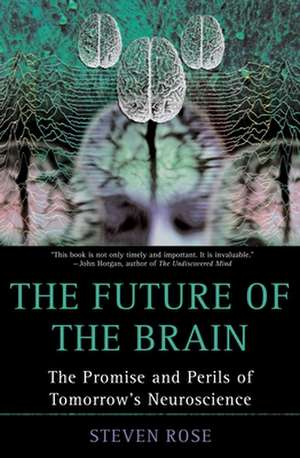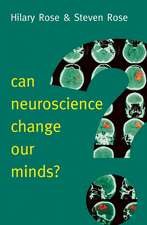The Future of the Brain
Autor Steven Roseen Limba Engleză Paperback – 31 mai 2006
In The Future of the Brain, Rose explores just how far neuroscience may help us understand the human brain--including consciousness--and to what extent cutting edge technologies should have the power to mend or manipulate the mind. Rose first offers a panoramic look at what we now know about the brain, from its three-billion-year evolution, to its astonishingly rapid development in the embryo, to the miraculous process of infant development. More important, he shows what all this science can--and cannot--tell us about the human condition. He examines questions that still baffle scientists and he explores the potential threats and promises of new technologies and their ethical, legal, and social implications, wondering how far we should go in eliminating unwanted behavior or enhancing desired characteristics, focusing on the new "brain steroids" and on the use of Ritalin to control young children.
The Future of the Brain is a remarkable look at what the brain sciences are telling us about who we are and where we came from--and where we may be headed in years to come.
Preț: 178.45 lei
Preț vechi: 187.83 lei
-5% Nou
Puncte Express: 268
Preț estimativ în valută:
34.15€ • 35.52$ • 28.19£
34.15€ • 35.52$ • 28.19£
Carte tipărită la comandă
Livrare economică 15-29 aprilie
Preluare comenzi: 021 569.72.76
Specificații
ISBN-13: 9780195308938
ISBN-10: 019530893X
Pagini: 344
Dimensiuni: 169 x 233 x 24 mm
Greutate: 0.5 kg
Editura: Oxford University Press
ISBN-10: 019530893X
Pagini: 344
Dimensiuni: 169 x 233 x 24 mm
Greutate: 0.5 kg
Editura: Oxford University Press
Descriere
Brain repair, smart pills, mind-reading machines--modern neuroscience promises to soon deliver a remarkable array of wonders as well as profound insight into the nature of the brain. But these exciting new breakthroughs, warns Steven Rose, will also raise troubling questions about what it means to be human. In The Future of the Brain, Rose explores just how far neuroscience may help us understand the human brain--including consciousness--and to what extent cutting edge technologies should have the power to mend or manipulate the mind. Rose first offers a panoramic look at what we now know about the brain, from its three-billion-year evolution, to its astonishingly rapid development in the embryo, to the miraculous process of infant development. More important, he shows what all this science can--and cannot--tell us about the human condition. He examines questions that still baffle scientists and he explores the potential threats and promises of new technologies and their ethical, legal, and social implications, wondering how far we should go in eliminating unwanted behavior or enhancing desired characteristics, focusing on the new "brain steroids" and on the use of Ritalin to control young children. The Future of the Brain is a remarkable look at what the brain sciences are telling us about who we are and where we came from--and where we may be headed in years to come.
Recenzii
"Rose has hacked through all the hype to tell us how far science has really come in explaining the human mind, how far it will probably go in the future, and what the consequences for allof us might be. This book is not only timely an dimportant. It is invaluable."--John Horgan, author of The Undiscovered Mind |k No
Notă biografică
Steven Rose is Professor of Biology and Director of the Brain and Behavior Research Group at The Open University, and is a Visiting Professor in the Department of Anatomy and Developmental Biology at University College, London. He has written or edited 15 books, including The Chemistry of Life, The Conscious Brain, The Making of Memory, and Not In Our Genes (with Richard Lewontin and Leo Kamin). He is a frequent radio and TV guest and has written for New York Times Book Review, New Scientist, and Times Literary Supplement.











